Assholes Holding the Hand of the Dying: The Mixed Aesthetics of Guardian of the Galaxy
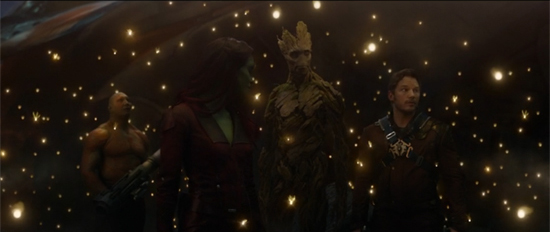
Image screen-captured from DisneyMoviesAnywhere.com.
The opening scene of 2014’s zaniest megabudget blockbuster is remarkably drab. In strict opposition to the vibrantly colorful world (and equally colorful dialog) teased in the film’s trailers, this scene features no jokes, nothing shiny, no space-age vehicles or thrilling heroics. Instead, the desaturated images show a poorly-lit hospital whose green-and-brown color scheme testifies to the sheer ugliness of 1980’s medical aesthetics. Visually, the only bright spot is the halo-like pillow surrounding young Peter Quill’s mother where she lies in bed, devoid of hair and eyebrows, dying of cancer.
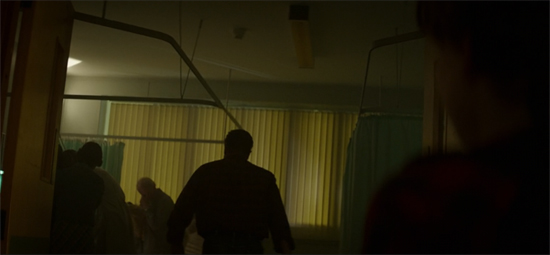
I’m not sure even Birdman pulls off an image this banal. Image screen-captured from DisneyMoviesAnywhere.com.
The brief scene is as one-note and dreary as the visuals; Quill’s mother describes his apparently deadbeat dad as “an angel” and asks Quill to take her hand. He doesn’t. She dies while he is still recoiling in horror. When Quill is left alone outside of her room, he flees from the hospital—where, in a moment of sheer artifice meant to contrast with all that went before, he is abducted by a beautiful starship.
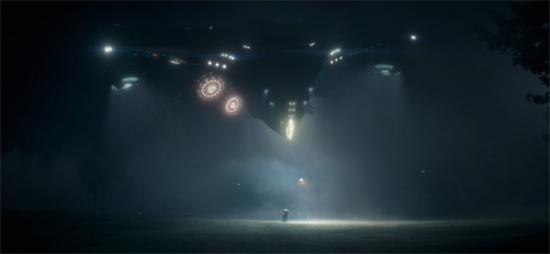
The 1980’s:when spaceships were as beautiful as hospitals were ugly. Image screen-captured from DisneyMoviesAnywhere.com.
Quill’s mother serves double narrative duty. In the first place, she represents everything Quill will spend the rest of the movie fleeing: responsibility, personal connections, and most of all death in its many guises. Yet despite her human origins, Quill’s mother also serves as the first of the film’s many striking images of otherworldly beauty: even dying of cancer she exudes a certain peaceful luminosity. She thus foreshadows the sort of spectacle science fiction excels at: not the derring-do, pyrotechnics, and fast-cutting of action scenes (though there will be plenty of that), but the otherworldly beauty found in many of the film’s nooks and crannies, as well as the promise (however superficially made) that filmgoers might learn to love and cherish that which appears disconcertingly alien.
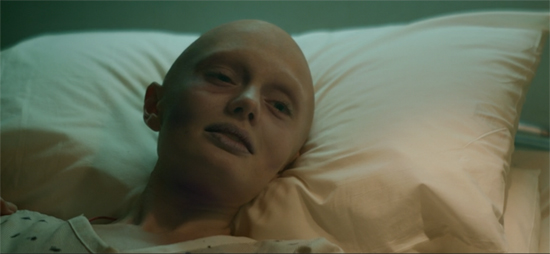
Image screen-captured from DisneyMoviesAnywhere.com.
The Disney-owned Marvel Studios is nothing if not a well-oiled machine for churning out clever-enough scripts that leave no narrative potential unused. So of course Quill’s mother makes a final appearance in the film. The story’s climax hinges upon an alien device of near infinite power, usable by Quill because of his arcane backstory. Yet as he does the expected save-the-universe thing, he participates in a vision where his mother appears in space, asking him once again to hold her hand.
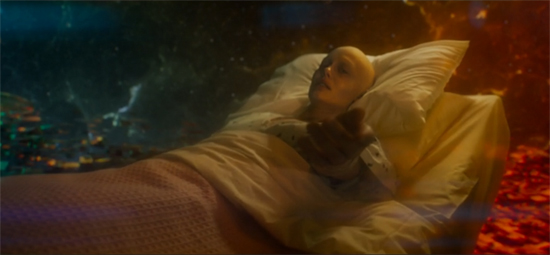
Image screen-captured from DisneyMoviesAnywhere.com.
The illusory hand of his mother turns out to be the real-life hand of Gamorrah, the blue-skinned assassin who serves as Quill’s love interest. Quill’s inability to comfort his mother at her death—with all its implied irresponsibility and lack of commitment—thus finds its antithesis in his ability to connect with his comrades. Quill not only manages to hold his mother’s hand as she dies, but his gripping of Gamorrah’s hand hints that he might also be capable of future relationships more robust than his previous anonymous economic or sexual transactions. Indeed, the struggle to of the desire for human connection against a hard-won cynicism dominates each of the film's characters, imparting a human undertone to their operatic histories. Gamorrah’s adoptive father may be a nigh omnipotent being in love with death, but he is also an emotionally abusive father. Similarly, Rocket Raccoon may be an irresponsible raccoon with an unaccountable enthusiasm for blowing up planets, but the script repeatedly reminds its audience that he’s been wounded both by his origin as an abomination of science, and by the fact that his creator has abandoned him. In holding Gamorrah’s hand, Quill both accepts death and joins a newfound community. The hand-holding thus echoes the film's most memorable scene, where Groot explains "we are Groot" while sacrificing himself for the rest of the crew. Not just Quill, but Groot and by extension the entire crew must accept the reality of death—only then can they regain a sense of communal belonging.
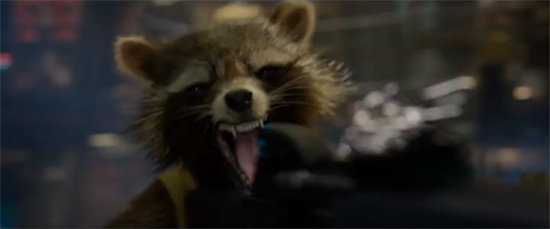 Yup. Even this guy has mixed feelings about his origins. Image screen-captured from DisneyMoviesAnywhere.com.
Yup. Even this guy has mixed feelings about his origins. Image screen-captured from DisneyMoviesAnywhere.com.
Of course, no one buys Imax 3D tickets expecting to see a moral drama about accepting death; the film’s obvious interest in mourning jars fascinatingly with the movie’s primary pleasure: that of watching an animate tree and talking squirrel make lots of people very dead while cracking jokes. The majority of the film’s running time and production values are dedicated to a series of well-planned and quite entertaining fights, wisecracks, and implausible-yet-cool special effects. Like so many superhero movies, the film revels in ridiculous (if bloodless) violence, perpetrated by characters sympathetic enough to attract an audience but malicious enough to steal people’s prostheses, rob ancient historical sites, shoot at policemen, and incite prison riots. Unlike many superhero movies, the film draws attention to the imperfect morality of its heroes’ hijinks. Thus alongside Groot’s moving claim that “we are Groot,” the movie has a second moral. “I'm an asshole, but what I am not is a 100% dick.” Perhaps the film’s greatest fantasy, then, is not that a man might fly a spaceship through a beautiful and diverse galaxy, but rather that the simple act of not being a total dick is worthy of great praise.
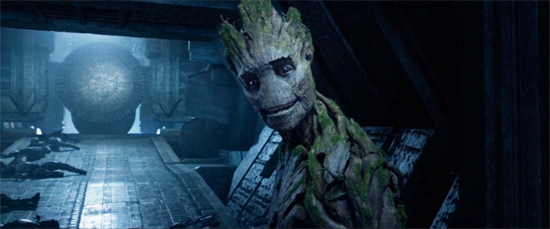
Image screen-captured from DisneyMoviesAnywhere.com.
The two themes perhaps come together in the above image of Groot. Here we have a talking tree, presumably a gentle soul and certainly the team’s conscience (even if he is only capable of speaking four words). He grins disarmingly at the audience. He is also celebrating his ability to violently pummel dozens of faceless soldiers to death. It is the perfect summary of the film as a whole: gleefully irresponsible popcorn entertainment with an admixture of humane compassion and vulnerability. I also can’t help but think, somehow, that this offers a more honest glimpse than most films into the nature and culture that made it the year's top grossing film: a people capable of great violence, great thoughtlessness, and great irresponsibility, yet also capable of a surprising amount of empathy, warmth, and connection.



Add new comment